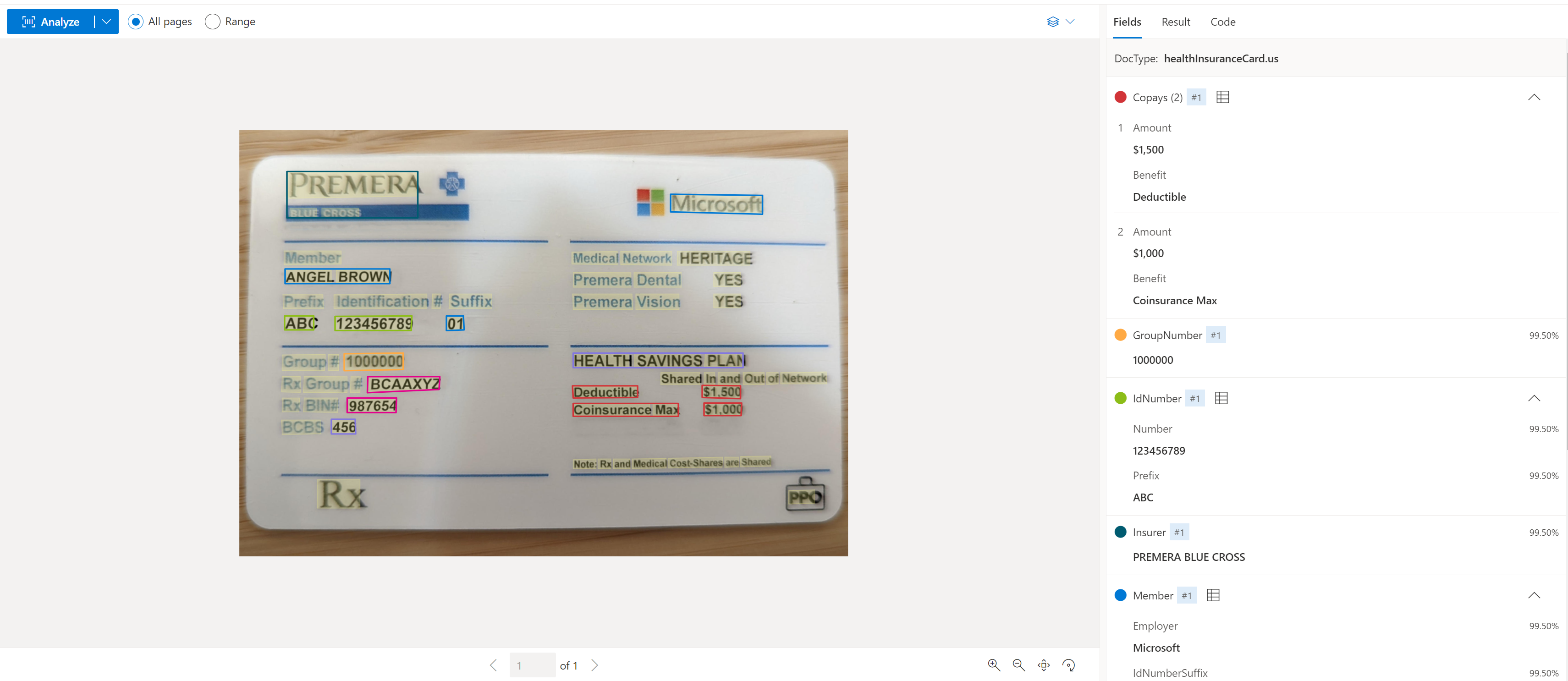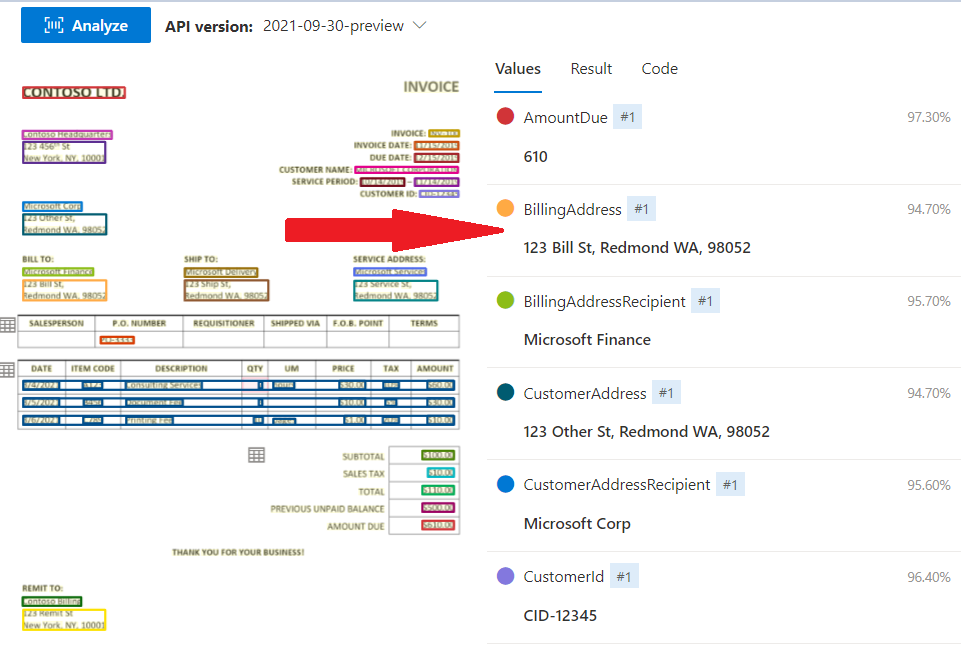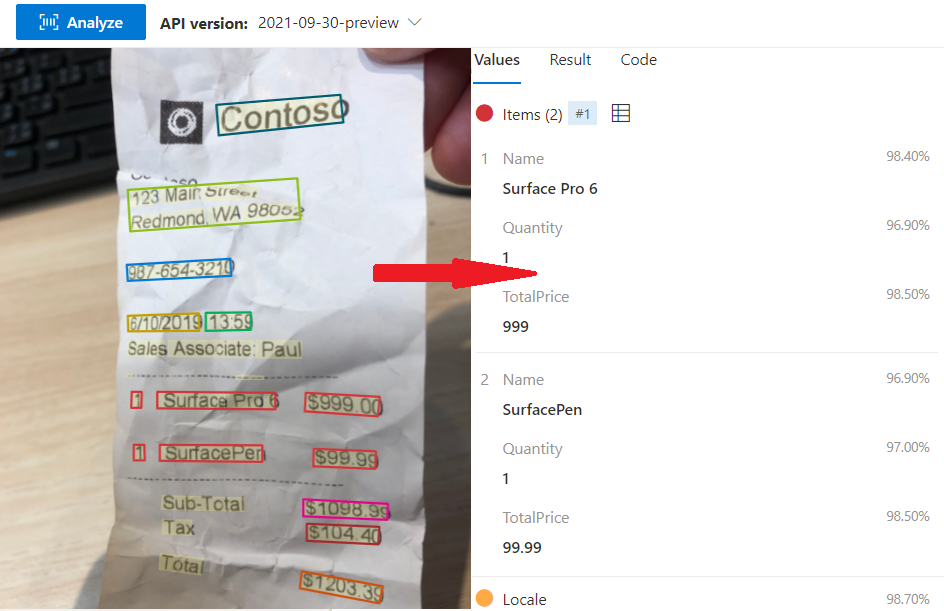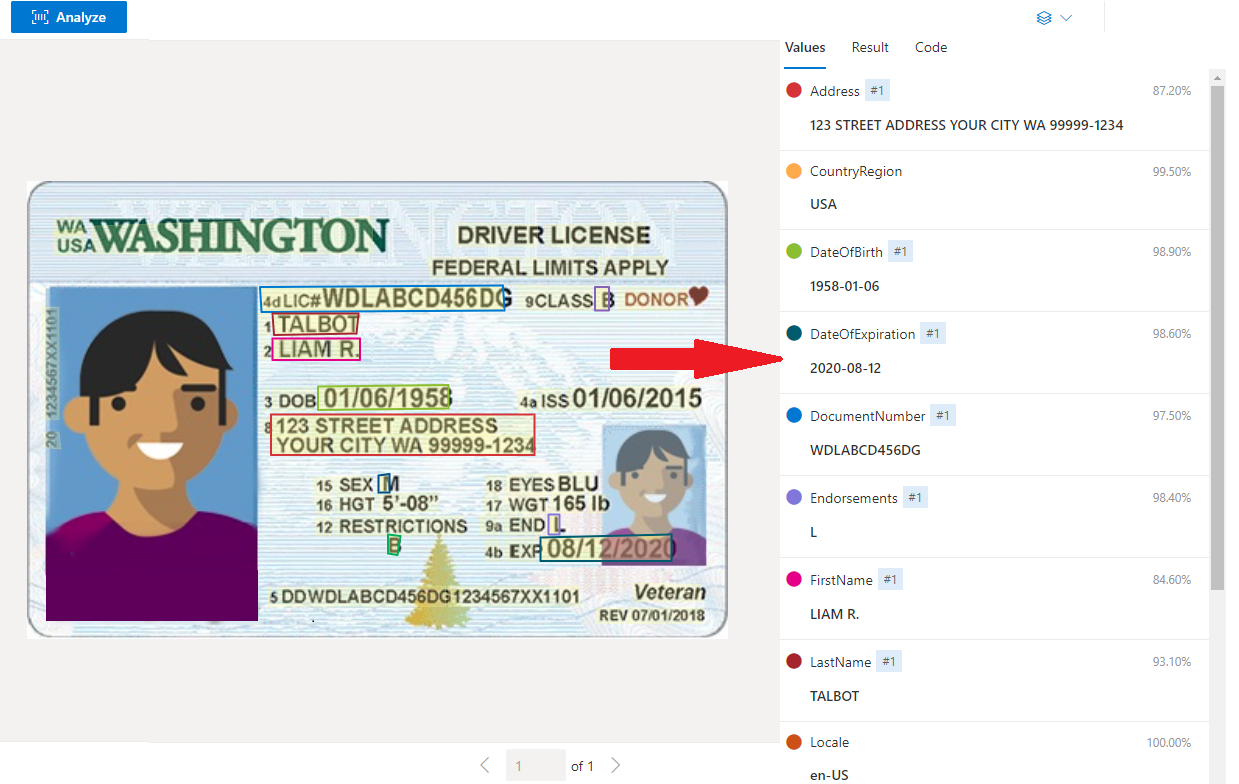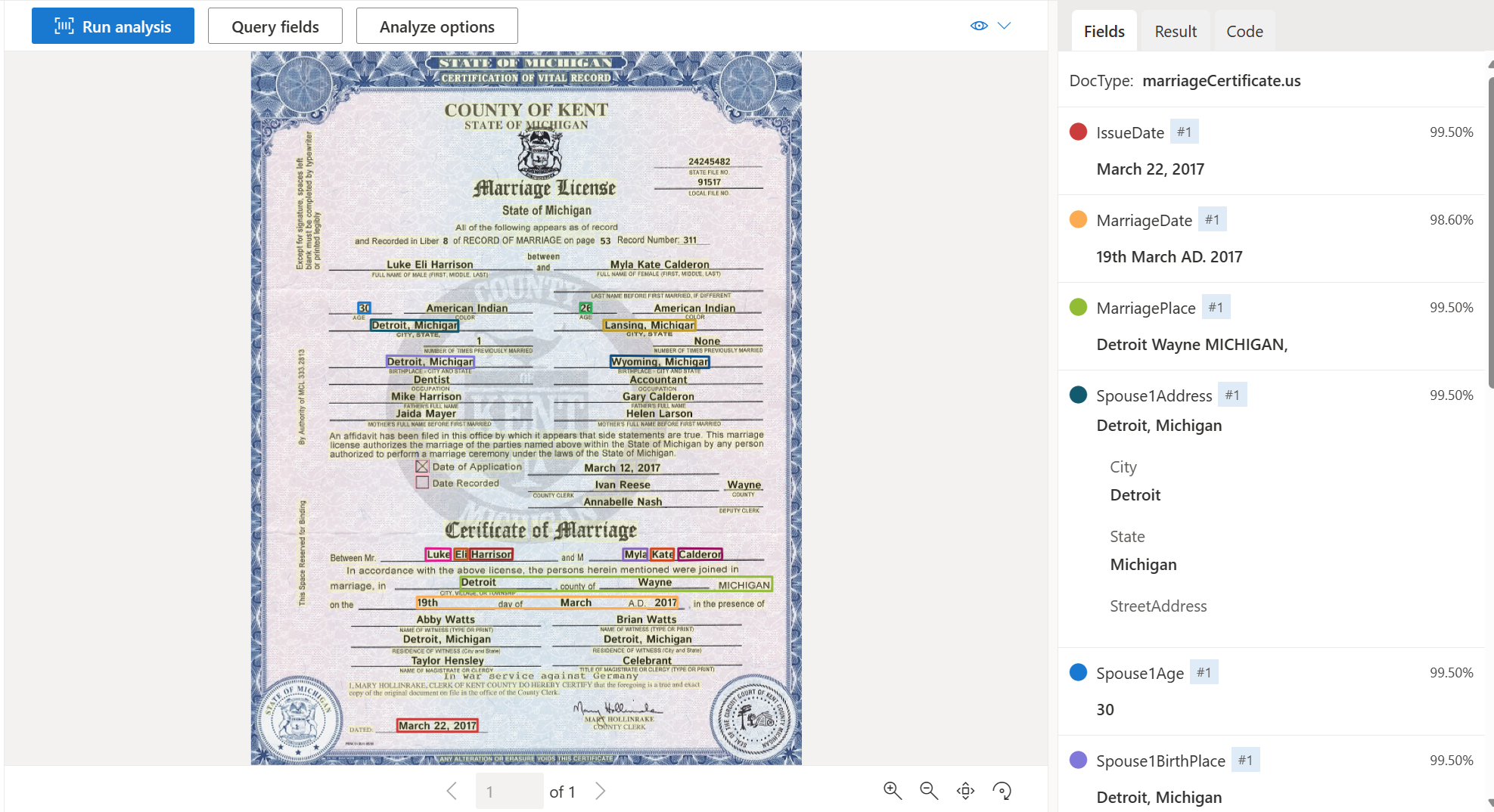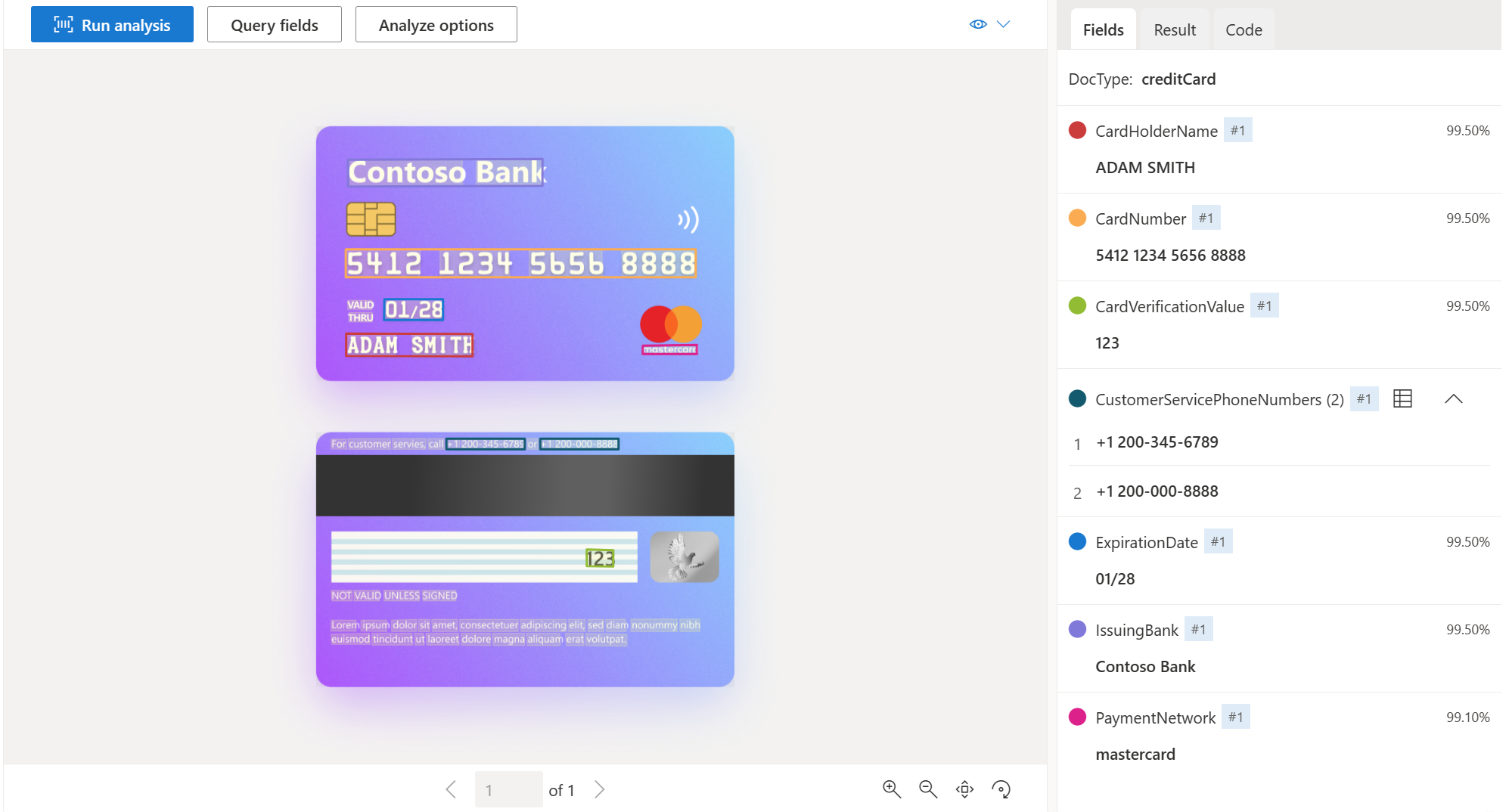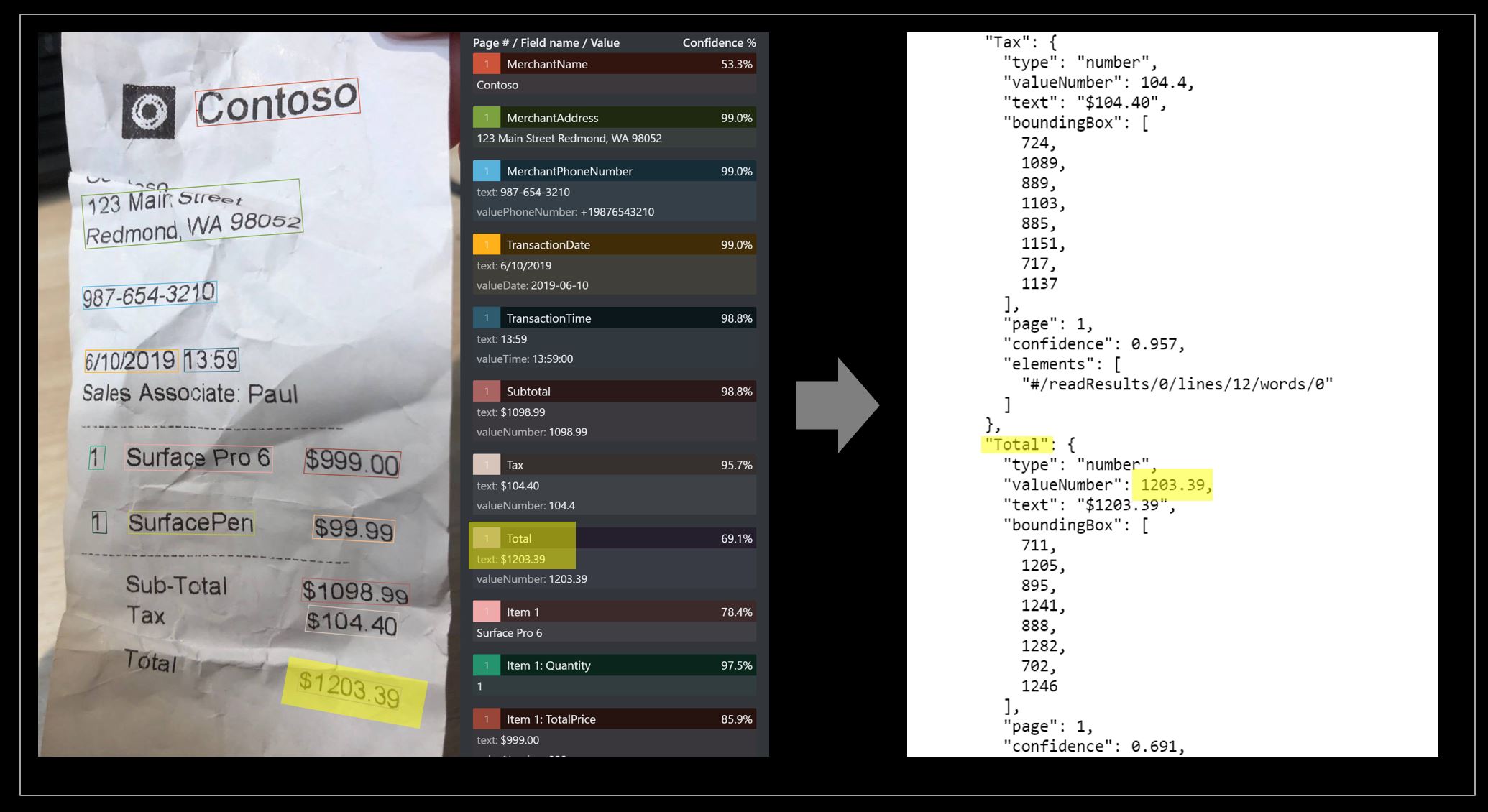Note
Access to this page requires authorization. You can try signing in or changing directories.
Access to this page requires authorization. You can try changing directories.
This content applies to: ![]() v2.1 | Latest version:
v2.1 | Latest version: ![]() v4.0 (GA)
v4.0 (GA)
Azure AI Document Intelligence supports various models that you can use to add intelligent document processing to your apps and flows. You can use a prebuilt domain-specific model or train a custom model tailored to your specific business needs and use cases. You can use Document Intelligence with the REST API or Python, C#, Java, and JavaScript client libraries.
Note
Document processing projects that involve financial data, protected health data, personal data, or highly sensitive data require careful attention. Be sure to comply with all national/regional and industry-specific requirements.
Model overview
The following table shows the generally available (GA) models for each stable API.
| Model type | Model | 2024-11-30 (GA) | 2023-07-31 (GA) | 2022-08-31 (GA) | v2.1 (GA) |
|---|---|---|---|---|---|
| Document analysis models | Read | ✔️ | ✔️ | ✔️ | Not available |
| Document analysis models | Layout | ✔️ | ✔️ | ✔️ | ✔️ |
| Document analysis models | General document** | Supported in layout model |
✔️ | ✔️ | Not available |
| Prebuilt models | Contract | ✔️ | ✔️ | Not available | Not available |
| Prebuilt models | Health insurance card | ✔️ | ✔️ | ✔️ | Not available |
| Prebuilt models | ID document | ✔️ | ✔️ | ✔️ | ✔️ |
| Prebuilt models | Invoice | ✔️ | ✔️ | ✔️ | ✔️ |
| Prebuilt models | Receipt | ✔️ | ✔️ | ✔️ | ✔️ |
| Prebuilt models | US unified tax* | ✔️ | Not available | Not available | Not available |
| Prebuilt models | US 1040 tax* | ✔️ | ✔️ | Not available | Not available |
| Prebuilt models | US 1095 tax* | ✔️ | Not available | Not available | Not available |
| Prebuilt models | US 1098 tax* | ✔️ | Not available | Not available | Not available |
| Prebuilt models | US 1099 tax* | ✔️ | Not available | Not available | Not available |
| Prebuilt models | US W2 tax | ✔️ | ✔️ | ✔️ | Not available |
| Prebuilt models | US W4 tax | ✔️ | Not available | Not available | Not available |
| Prebuilt models | US mortgage 1003 URLA | ✔️ | Not available | Not available | Not available |
| Prebuilt models | US mortgage 1004 URAR | ✔️ | Not available | Not available | Not available |
| Prebuilt models | US mortgage 1005 | ✔️ | Not available | Not available | Not available |
| Prebuilt models | US mortgage 1008 summary | ✔️ | Not available | Not available | Not available |
| Prebuilt models | US mortgage closing disclosure | ✔️ | Not available | Not available | Not available |
| Prebuilt models | Marriage certificate | ✔️ | Not available | Not available | Not available |
| Prebuilt models | Credit card | ✔️ | Not available | Not available | Not available |
| Prebuilt models | Business card | deprecated | ✔️ | ✔️ | ✔️ |
| Custom classification model | Custom classifier | ✔️ | ✔️ | Not available | Not available |
| Custom extraction model | Custom template | ✔️ | ✔️ | ✔️ | ✔️ |
| Custom extraction model | Custom composed | ✔️ | ✔️ | ✔️ | ✔️ |
| All models | Add-on capabilities | ✔️ | ✔️ | Not available | Not available |
* Contains submodels. See the model-specific information for supported variations and subtypes.
** All the capabilities for the general document model are available in the layout model. The general model is no longer supported.
Latency
Latency is the amount of time it takes for an API server to handle and process an incoming request and deliver the outgoing response to the client. The time to analyze a document depends on the size (for example, number of pages) and associated content on each page. Document Intelligence is a multitenant asynchronous service where latency for similar documents is comparable but not always identical. Occasional variability in latency and performance is inherent in any microservice-based, stateless service that processes images and large documents at scale. Although we're continuously scaling up the hardware and capacity and scaling capabilities, you might still have latency issues at runtime.
Add-on capability
The following add-on capabilities are available for Document Intelligence. For all models except the business card model, Document Intelligence now supports add-on capabilities to allow for more sophisticated analysis. You can enable and disable these optional capabilities depending on the scenario of the document extraction. The following add-on capabilities are available for the 2023-07-31 (GA) and later API version:
ocrHighResolutionformulasstyleFontbarcodeslanguageskeyValuePairsqueryFields(not available with the US tax models)searchablePDF(available only for the read model)
| Add-on capability | Add-on/Free | 2024-11-30 (GA) | 2023-07-31 (GA) | 2022-08-31 (GA) | v2.1 (GA) |
|---|---|---|---|---|---|
| Font property extraction | Add-on | ✔️ | ✔️ | Not available | Not available |
| Formula extraction | Add-on | ✔️ | ✔️ | Not available | Not available |
| High-resolution extraction | Add-on | ✔️ | ✔️ | Not available | Not available |
| Barcode extraction | Free | ✔️ | ✔️ | Not available | Not available |
| Language detection | Free | ✔️ | ✔️ | Not available | Not available |
| Key/value pairs | Free | ✔️ | Not available | Not available | Not available |
| Query fields | Add-on* | ✔️ | Not available | Not available | Not available |
| Searchable PDF | Add-on* | ✔️ | Not available | Not available | Not available |
Model analysis features
| Model ID | Content extraction | Query fields | Paragraphs | Paragraph roles | Selection marks | Tables | Key/value pairs | Languages | Barcodes | Document analysis | Formulas* | Style font* | High resolution* | Searchable PDF |
|---|---|---|---|---|---|---|---|---|---|---|---|---|---|---|
prebuilt-read |
✓ | ✓ | O | O | O | O | O | O | ||||||
prebuilt-layout |
✓ | ✓ | ✓ | ✓ | ✓ | ✓ | O | O | O | O | O | O | ||
prebuilt-contract |
✓ | ✓ | ✓ | ✓ | ✓ | O | O | ✓ | O | O | ||||
prebuilt-healthInsuranceCard.us |
✓ | ✓ | O | O | ✓ | O | O | O | ||||||
prebuilt-idDocument |
✓ | ✓ | O | O | ✓ | O | O | O | ||||||
prebuilt-invoice |
✓ | ✓ | ✓ | ✓ | O | O | O | ✓ | O | O | O | |||
prebuilt-receipt |
✓ | ✓ | O | O | ✓ | O | O | O | ||||||
prebuilt-marriageCertificate.us |
✓ | ✓ | ✓ | O | O | ✓ | O | O | O | |||||
prebuilt-creditCard |
✓ | ✓ | O | O | ✓ | O | O | O | ||||||
prebuilt-check.us |
✓ | ✓ | O | O | ✓ | O | O | O | ||||||
prebuilt-payStub.us |
✓ | ✓ | O | O | ✓ | O | O | O | ||||||
prebuilt-bankStatement |
✓ | ✓ | O | O | ✓ | O | O | O | ||||||
prebuilt-mortgage.us.1003 |
✓ | ✓ | ✓ | O | O | ✓ | O | O | O | |||||
prebuilt-mortgage.us.1004 |
✓ | ✓ | ✓ | O | O | ✓ | O | O | O | |||||
prebuilt-mortgage.us.1005 |
✓ | ✓ | ✓ | O | O | ✓ | O | O | O | |||||
prebuilt-mortgage.us.1008 |
✓ | ✓ | ✓ | O | O | ✓ | O | O | O | |||||
prebuilt-mortgage.us.closingDisclosure |
✓ | ✓ | ✓ | O | O | ✓ | O | O | O | |||||
prebuilt-tax.us |
✓ | ✓ | ✓ | O | O | ✓ | O | O | O | |||||
prebuilt-tax.us.w2 |
✓ | ✓ | ✓ | O | O | ✓ | O | O | O | |||||
prebuilt-tax.us.w4 |
✓ | ✓ | O | O | ✓ | O | O | O | ||||||
prebuilt-tax.us.1040 (various) |
✓ | ✓ | ✓ | O | O | ✓ | O | O | O | |||||
prebuilt-tax.us.1095A |
✓ | ✓ | O | O | ✓ | O | O | O | ||||||
prebuilt-tax.us.1095C |
✓ | ✓ | O | O | ✓ | O | O | O | ||||||
prebuilt-tax.us.1098 |
✓ | ✓ | ✓ | O | O | ✓ | O | O | O | |||||
prebuilt-tax.us.1098E |
✓ | ✓ | ✓ | O | O | ✓ | O | O | O | |||||
prebuilt-tax.us.1098T |
✓ | ✓ | ✓ | O | O | ✓ | O | O | O | |||||
prebuilt-tax.us.1099 (various) |
✓ | ✓ | ✓ | O | O | ✓ | O | O | O | |||||
prebuilt-tax.us.1099SSA |
✓ | ✓ | O | O | ✓ | O | O | O | ||||||
{ customModelName } |
✓ | ✓ | ✓ | ✓ | ✓ | ✓ | O | O | ✓ | O | O | O |
✓ - Enabled
O - Optional
* - Premium features incur extra costs
Query fields are priced differently from the other add-on features. For more information, see Pricing.
Bounding box and polygon coordinates
A bounding box (polygon in v3.0 and later versions) is an abstract rectangle that surrounds text elements in a document. A bounding box is used as a reference point for object detection:
- The bounding box specifies position by using an x and y coordinate plane presented in an array of four numerical pairs. Each pair represents a corner of the box in the following order: upper left, upper right, lower right, lower left.
- Image coordinates are presented in pixels. For a PDF, coordinates are presented in inches.
Language support
The universal models in Document Intelligence that are based on deep learning support many languages. The models can extract multilingual text from your images and documents, including text lines with mixed languages. Language support varies by Document Intelligence service functionality. For a complete list, see the following articles:
- Language support: Document analysis models
- Language support: Prebuilt models
- Language support: Custom models
Regional availability
Document Intelligence is generally available in many of the Azure infrastructure regions.
Model details
This section describes the output that you can expect from each model. You can extend the output of most models with add-on features.
Read OCR

The Read API uses optical character recognition (OCR) to analyze and extract lines and words, their locations, detected languages, and handwriting style, if detected.
This sample document was processed by using Document Intelligence Studio.
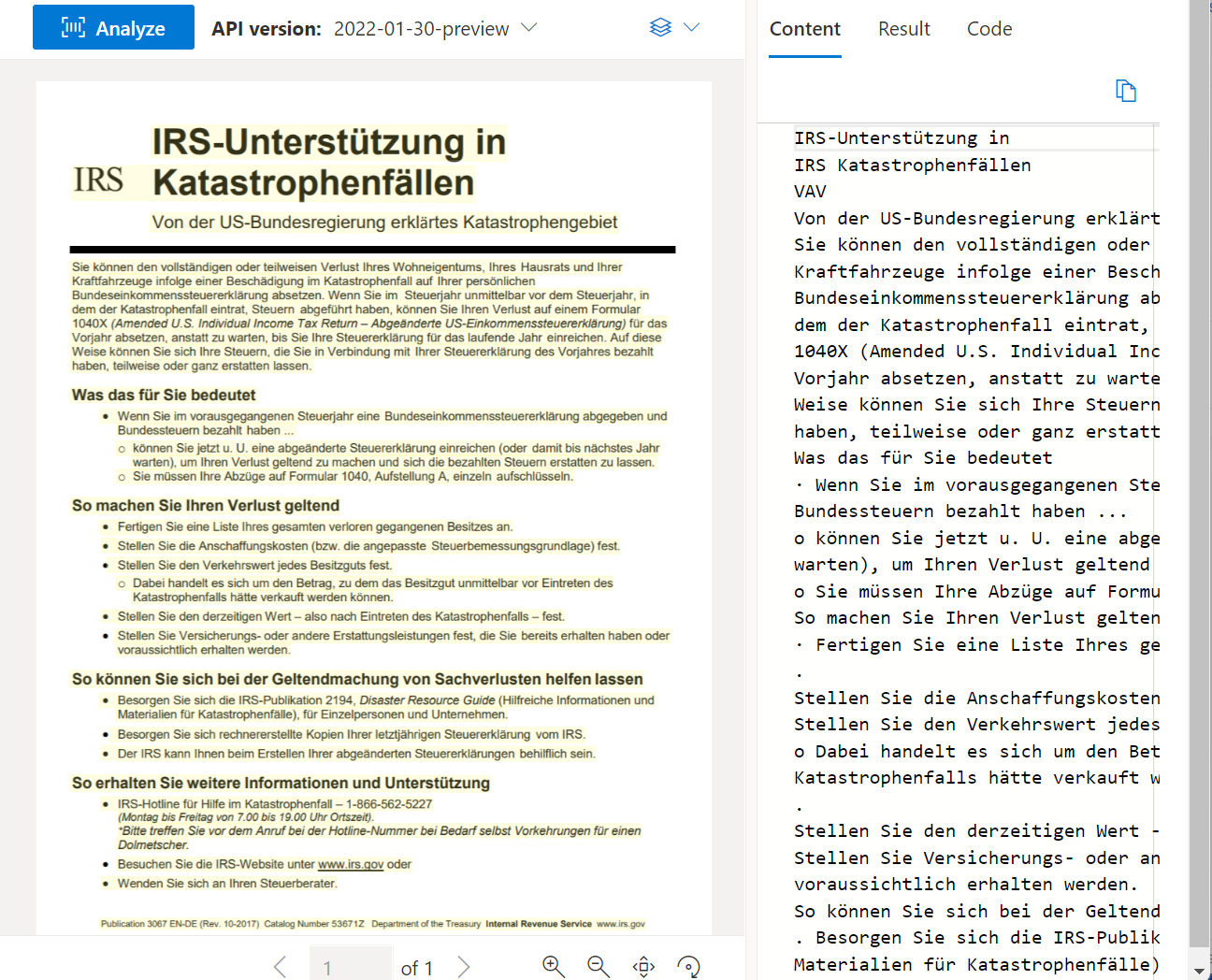
Layout analysis

The layout analysis model analyzes and extracts text, tables, selection marks, and other structure elements like titles, section headings, page headers, and page footers.
This sample document was processed by using Document Intelligence Studio.
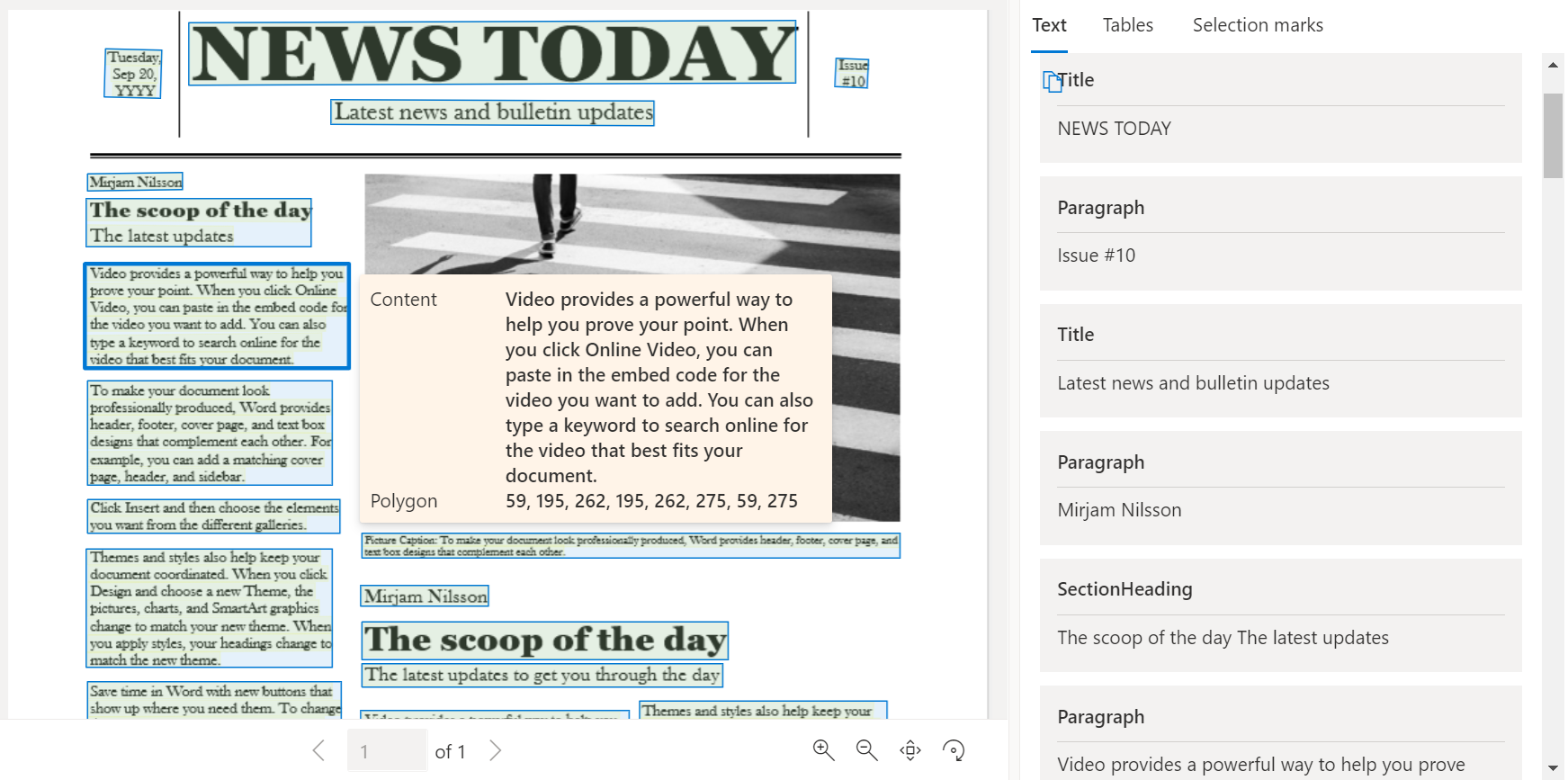
Health insurance card

The health insurance card model combines powerful OCR capabilities with deep learning models to analyze and extract key information from US health insurance cards.
This sample US health insurance card was processed by using Document Intelligence Studio.
US tax documents

The US tax document models analyze and extract key fields and line items from a select group of tax documents. The API supports the analysis of English-language US tax documents of various formats and quality, including phone-captured images, scanned documents, and digital PDFs. The following models are currently supported:
| Model | Description | Model ID |
|---|---|---|
| US tax W-2 | Extract taxable compensation details. | prebuilt-tax.us.w2 |
| US tax W-4 | Extract taxable compensation details. | prebuilt-tax.us.w4 |
| US tax 1040 | Extract mortgage interest details. | prebuilt-tax.us.1040 (variations) |
| US tax 1095 | Extract health insurance details. | prebuilt-tax.us.1095 (variations) |
| US tax 1098 | Extract mortgage interest details. | prebuilt-tax.us.1098 (variations) |
| US tax 1099 | Extract income received from sources other than employer. | prebuilt-tax.us.1099 (variations) |
This sample W-2 document was processed by using Document Intelligence Studio.
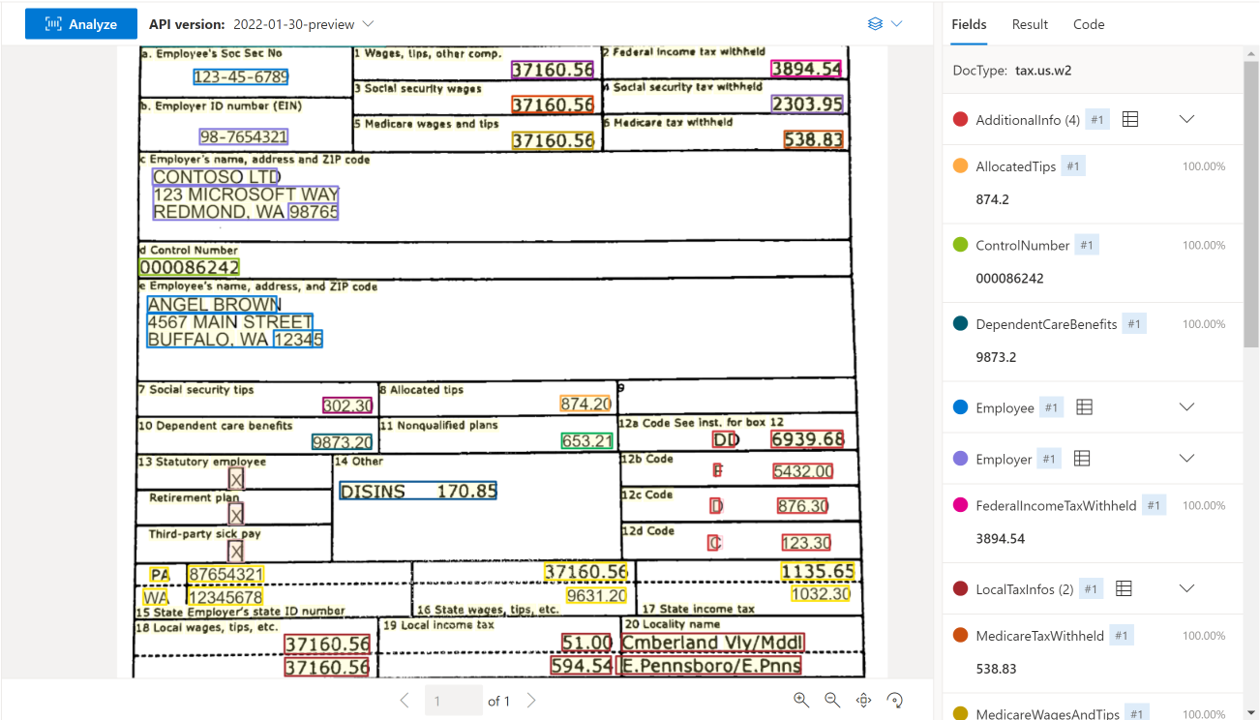
US mortgage documents
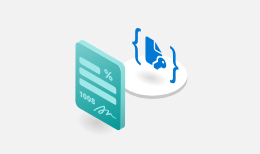
The US mortgage document models analyze and extract key fields that include borrower, loan, and property information from a select group of mortgage documents. The API supports the analysis of English-language US mortgage documents of various formats and quality, including phone-captured images, scanned documents, and digital PDFs. The following models are currently supported.
| Model | Description | Model ID |
|---|---|---|
| 1003 End-User License Agreement | Extract loan, borrower, property details. | prebuilt-mortgage.us.1003 |
| 1004 Uniform Residential Appraisal Report (URAR) | Extract loan, borrower, property details. | prebuilt-mortgage.us.1004 |
| 1005 Verification of employment | Extract loan, borrower, property details. | prebuilt-mortgage.us.1005 |
| 1008 Summary document | Extract borrower, seller, property, mortgage, and underwriting details. | prebuilt-mortgage.us.1008 |
| Closing Disclosure | Extract closing, transaction costs, and loan details. | prebuilt-mortgage.us.closingDisclosure |
This sample Closing Disclosure document was processed by using Document Intelligence Studio.
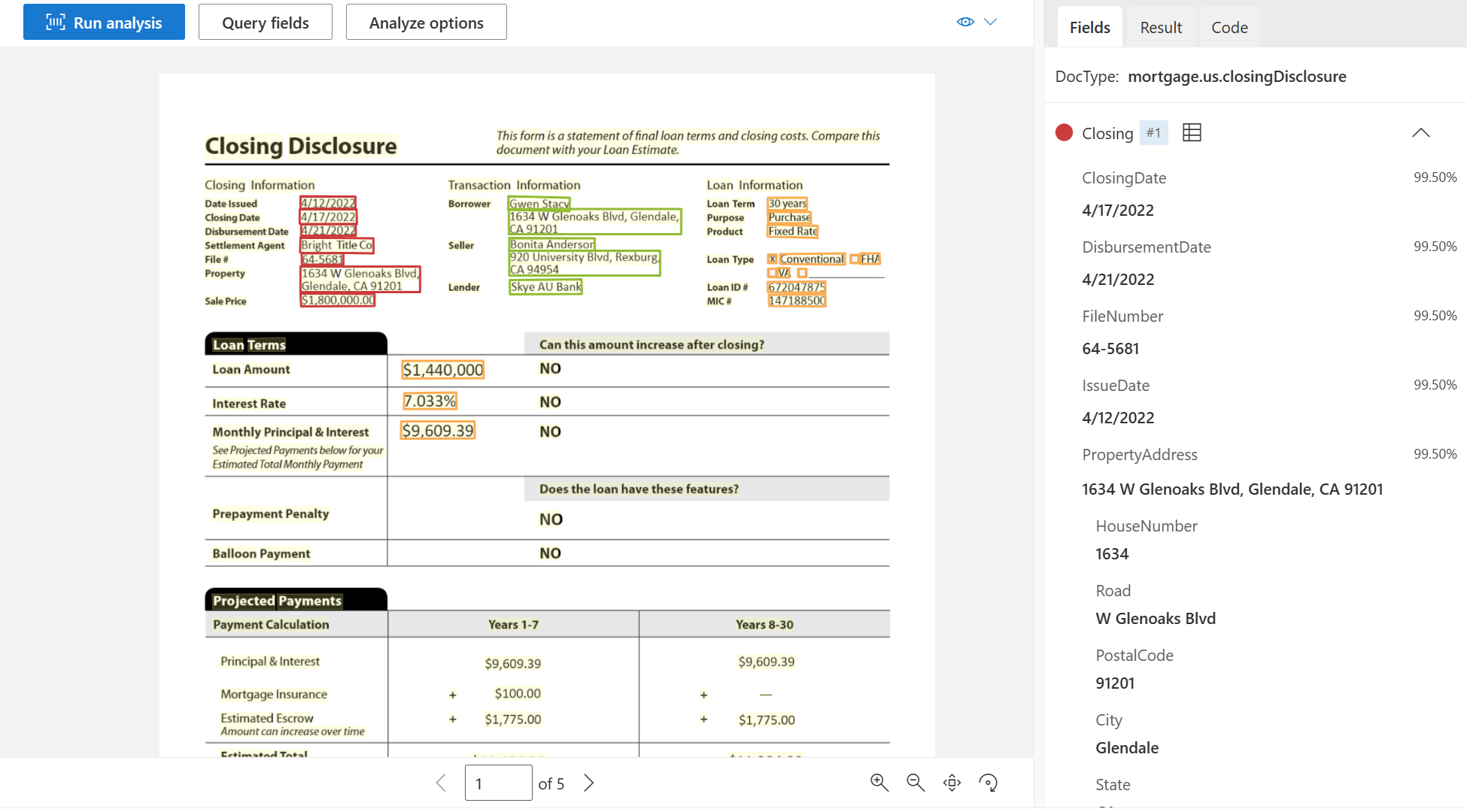
Contract
![]()
The contract model analyzes and extracts key fields and line items from contractual agreements, including parties, jurisdictions, contract ID, and title. The model currently supports English-language contract documents.
This sample contract was processed by using Document Intelligence Studio.
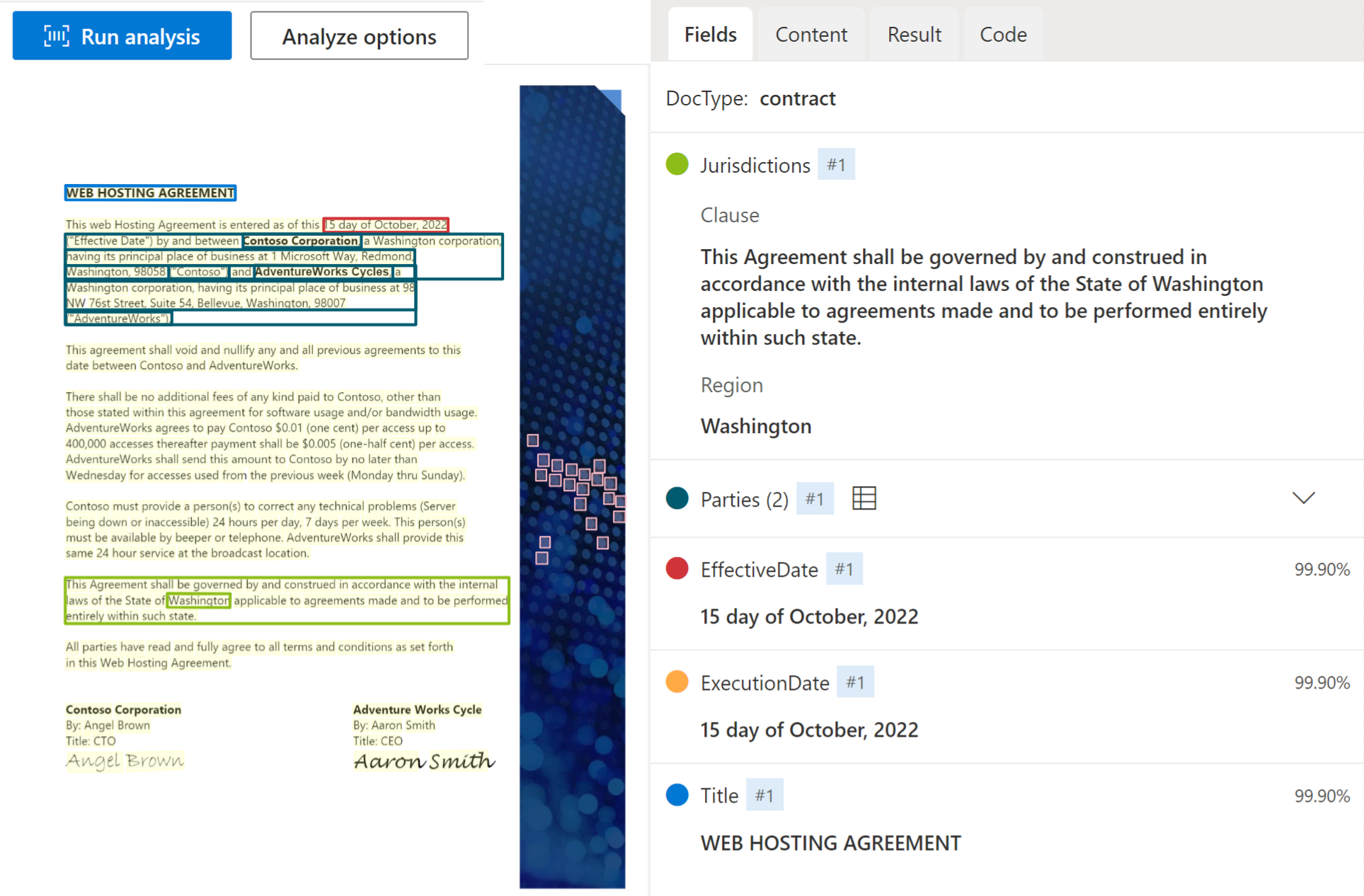
Invoice

The invoice model automates the processing of invoices to extract the customer name, billing address, due date, amount due, line items, and other key data.
This sample invoice was processed by using Document Intelligence Studio.
Receipt

Use the receipt model to scan sales receipts for the merchant name, dates, line items, quantities, and totals from printed and handwritten receipts. Version v3.0 also supports single-page hotel receipt processing.
This sample receipt was processed by using Document Intelligence Studio.
Identity document

Use the identity document (ID) model to process US driver's licenses (all 50 states and District of Columbia) and biographical pages from international passports (excluding visa and other travel documents) to extract key fields.
This sample US driver's license was processed by using Document Intelligence Studio.
Marriage certificate
![]()
Use the marriage certificate model to process US marriage certificates to extract key fields, including the individuals, date, and location.
This sample US marriage certificate was processed by using Document Intelligence Studio.
Credit card
![]()
Use the credit card model to process credit and debit cards to extract key fields.
This sample credit card was processed by using Document Intelligence Studio.
Custom models

Custom models are broadly classified into two types. Custom classification models that support classification of a "document type" and custom extraction models that can extract a defined schema from a specific document type.
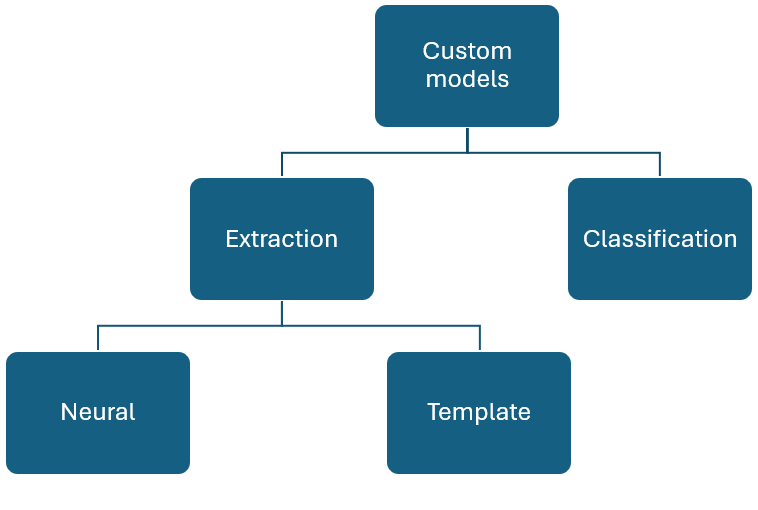
Custom document models analyze and extract data from forms and documents specific to your business. They recognize form fields within your distinct content and extract key/value pairs and table data. You need only one example of the form type to get started.
Version v3.0 and later custom models support signature detection in custom template (form) and cross-page tables in both template and neural models. Signature detection looks for the presence of a signature, not the identity of the person who signs the document. If the model returns unsigned for signature detection, the model didn't find a signature in the defined field.
This sample custom template was processed by using Document Intelligence Studio.
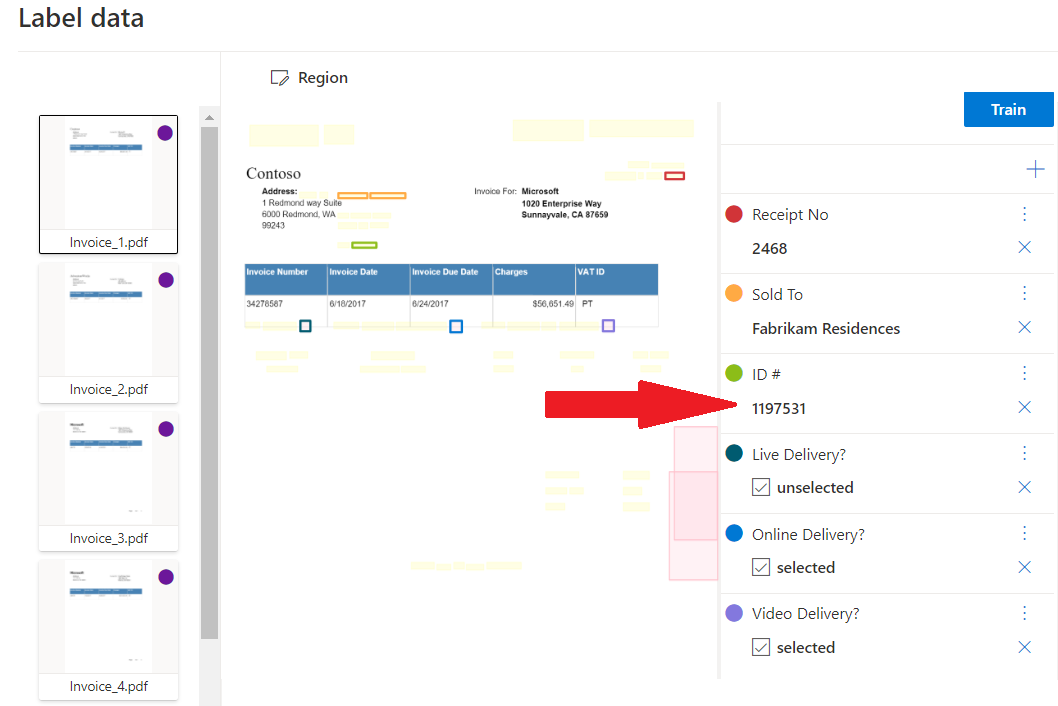
Custom extraction

Custom extraction model can be custom template. To create a custom extraction model, label a dataset of documents with the values you want extracted and train the model on the labeled dataset. You need only five examples of the same form or document type to get started.
This sample custom extraction was processed by using Document Intelligence Studio.

Custom classifier

With the custom classification model, you can identify the document type before you invoke the extraction model. The classification model is available starting with the 2023-07-31 (GA) API. Training a custom classification model requires at least two distinct classes and a minimum of five samples per class.
Composed models
A composed model is created by taking a collection of custom models and assigning them to a single model built from your form types. You can assign multiple custom models to a composed model that are called with a single model ID. You can assign up to 200 trained custom models to a single composed model.
This sample composed model is in Document Intelligence Studio.
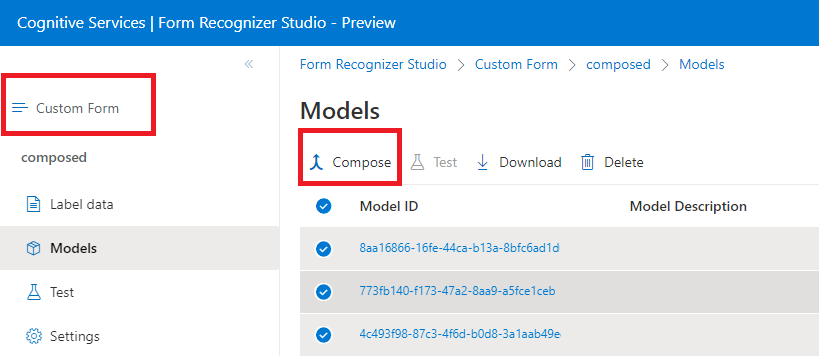
Input requirements
The following file formats are supported.
| Model | Image: JPEG/JPG, PNG, BMP, TIFF, HEIF |
Office: Word (DOCX), Excel (XLSX), PowerPoint (PPTX), HTML |
|
|---|---|---|---|
| Read | ✔ | ✔ | ✔ |
| Layout | ✔ | ✔ | ✔ |
| General document | ✔ | ✔ | |
| Prebuilt | ✔ | ✔ | |
| Custom extraction | ✔ | ✔ | |
| Custom classification | ✔ | ✔ | ✔ |
- Photos and scans: For best results, provide one clear photo or high-quality scan per document.
- PDFs and TIFFs: For PDFs and TIFFs, up to 2,000 pages can be processed. (With a free-tier subscription, only the first two pages are processed.)
- File size: The file size for analyzing documents is 500 MB for the paid (S0) tier and 4 MB for the free (F0) tier.
- Image dimensions: The dimensions must be between 50 pixels x 50 pixels and 10,000 pixels x 10,000 pixels.
- Password locks: If your PDFs are password-locked, you must remove the lock before submission.
- Text height: The minimum height of the text to be extracted is 12 pixels for a 1024 x 768-pixel image. This dimension corresponds to about 8-point text at 150 dots per inch.
- Custom model training: The maximum number of pages for training data is 500 for the custom template model and 50,000 for the custom neural model.
- Custom extraction model training: The total size of training data is 50 MB for template model and 1 GB for the neural model.
- Custom classification model training: The total size of training data is 1 GB with a maximum of 10,000 pages. For 2024-11-30 (GA), the total size of training data is 2 GB with a maximum of 10,000 pages.
- Office file types (DOCX, XLSX, PPTX): The maximum string length limit is 8 million characters.
Note
The Sample Labeling tool doesn't support the BMP file format. The limitation derives from the tool not the Document Intelligence Service.
Version migration
Learn how to use Document Intelligence v3.0 in your applications by following the steps in the Document Intelligence v3.1 migration guide.
| Model | Description |
|---|---|
| Document analysis | |
| Layout | Extract text and layout information from documents. |
| Prebuilt | |
| Invoice | Extract key information from English-language and Spanish-language invoices. |
| Receipt | Extract key information from English-language receipts. |
| ID document | Extract key information from US driver's licenses and international passports. |
| Business card | Extract key information from English-language business cards. |
| Custom | |
| Custom | Extract data from forms and documents specific to your business. Custom models are trained for your distinct data and use cases. |
| Composed | Compose a collection of custom models and assign them to a single model built from your form types. |
Layout
The Layout API analyzes and extracts text, tables and headers, selection marks, and structure information from documents.
This sample document was processed by using the Sample Labeling tool.
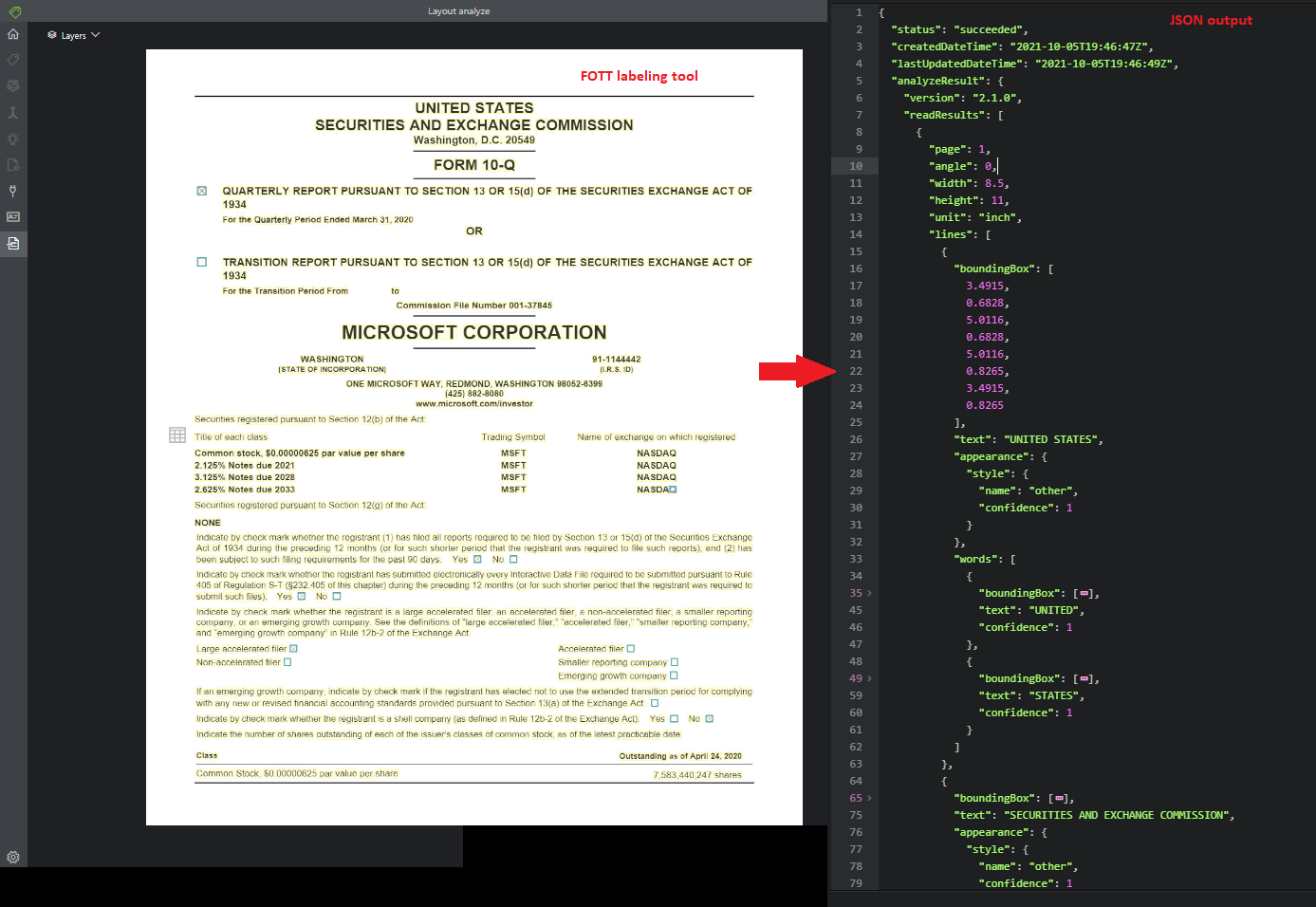
Invoice
The invoice model analyzes and extracts key information from sales invoices. The API analyzes invoices in various formats and extracts key information such as customer name, billing address, due date, and amount due.
This sample invoice was processed by using the Sample Labeling tool.
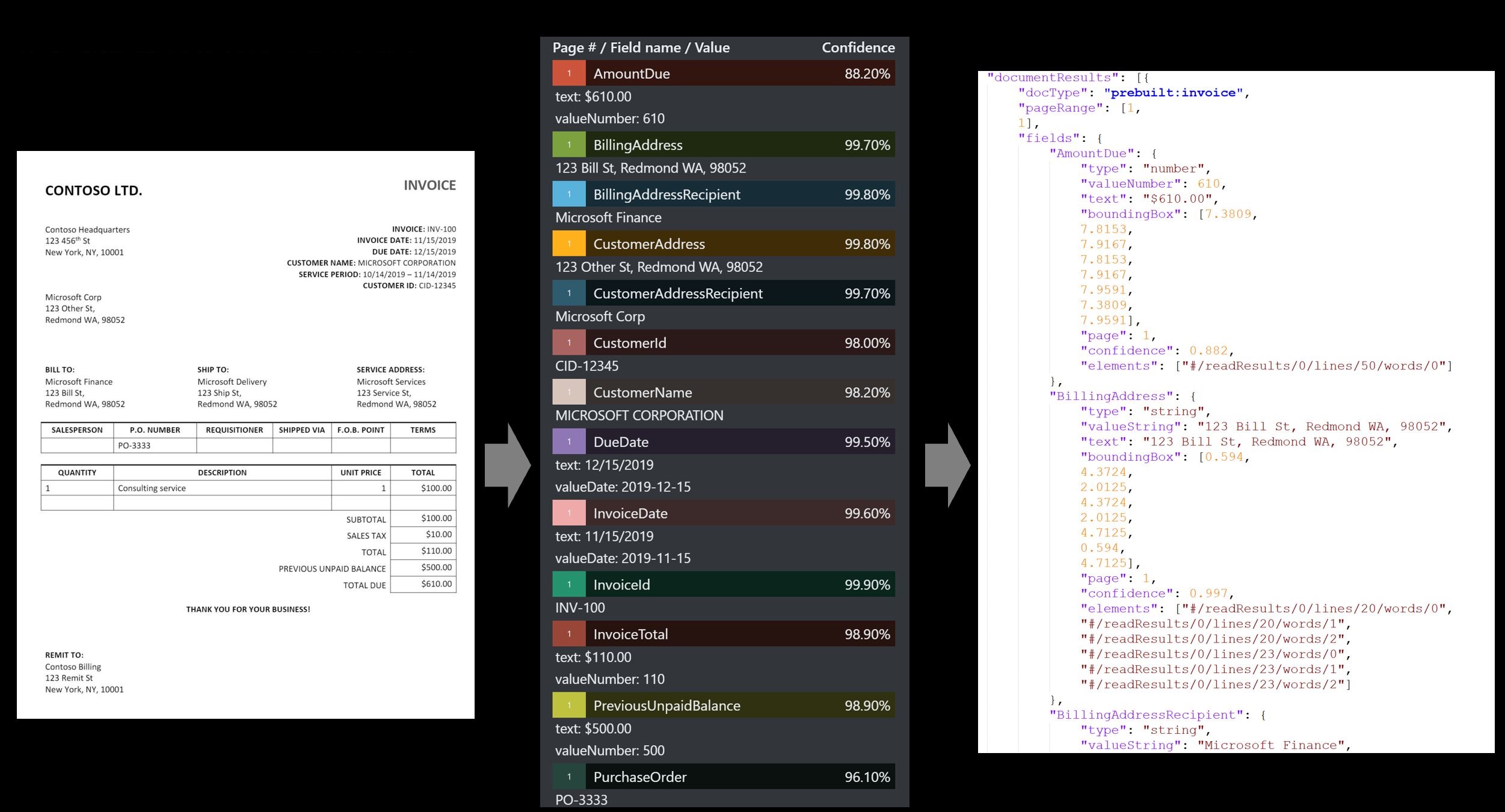
Receipt
The receipt model analyzes and extracts key information from printed and handwritten sales receipts.
This sample receipt was processed by using the Sample Labeling tool.
ID document
The ID document model analyzes and extracts key information from the following documents:
- US driver's licenses (all 50 states and District of Columbia)
- Biographical pages from international passports (excluding visa and other travel documents). The API analyzes and extracts identity documents.
This sample US driver's license was processed by using the Sample Labeling tool.
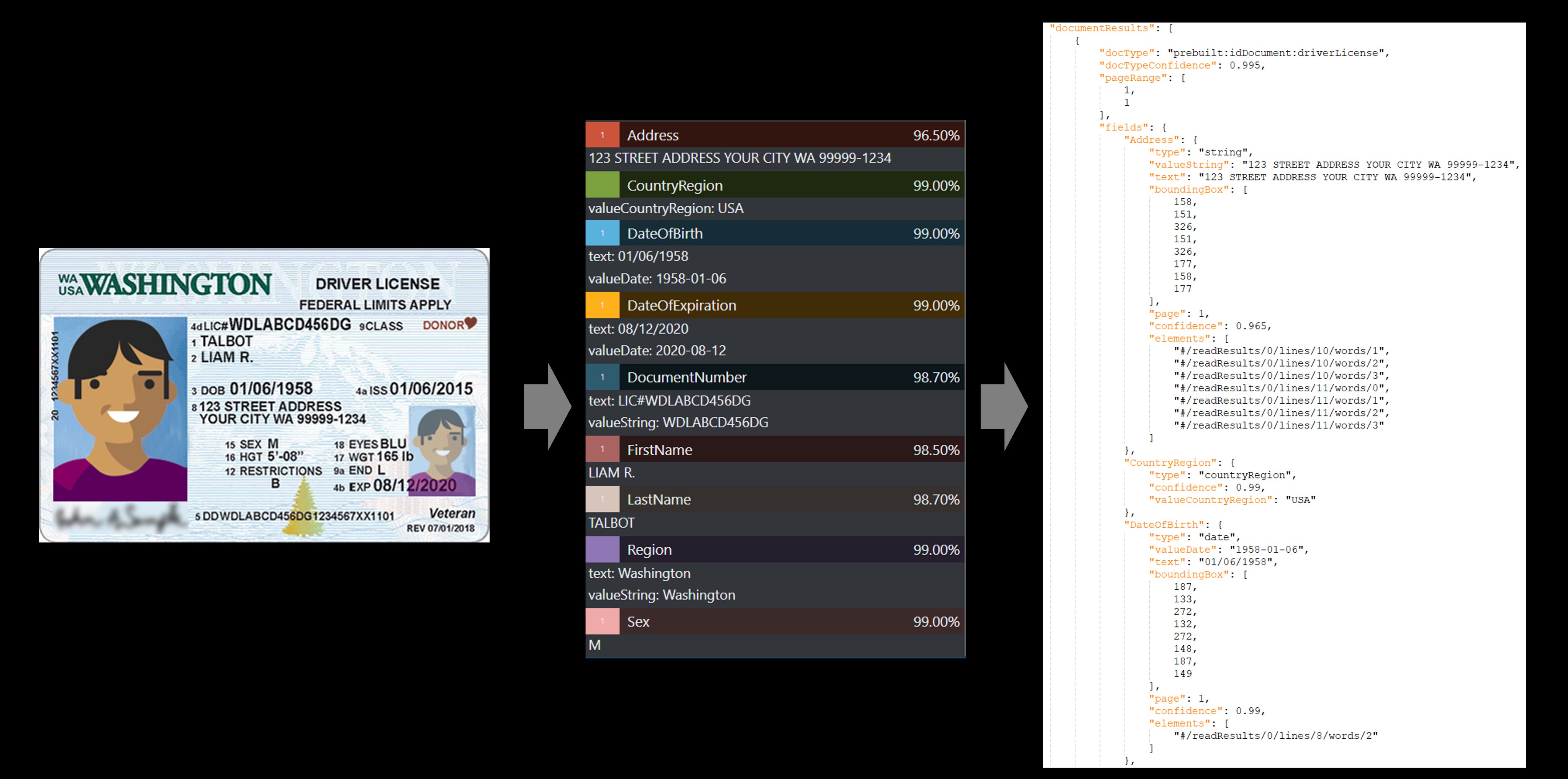
Business card
The business card model analyzes and extracts key information from business card images.
This sample business card was processed by using the Sample Labeling tool.
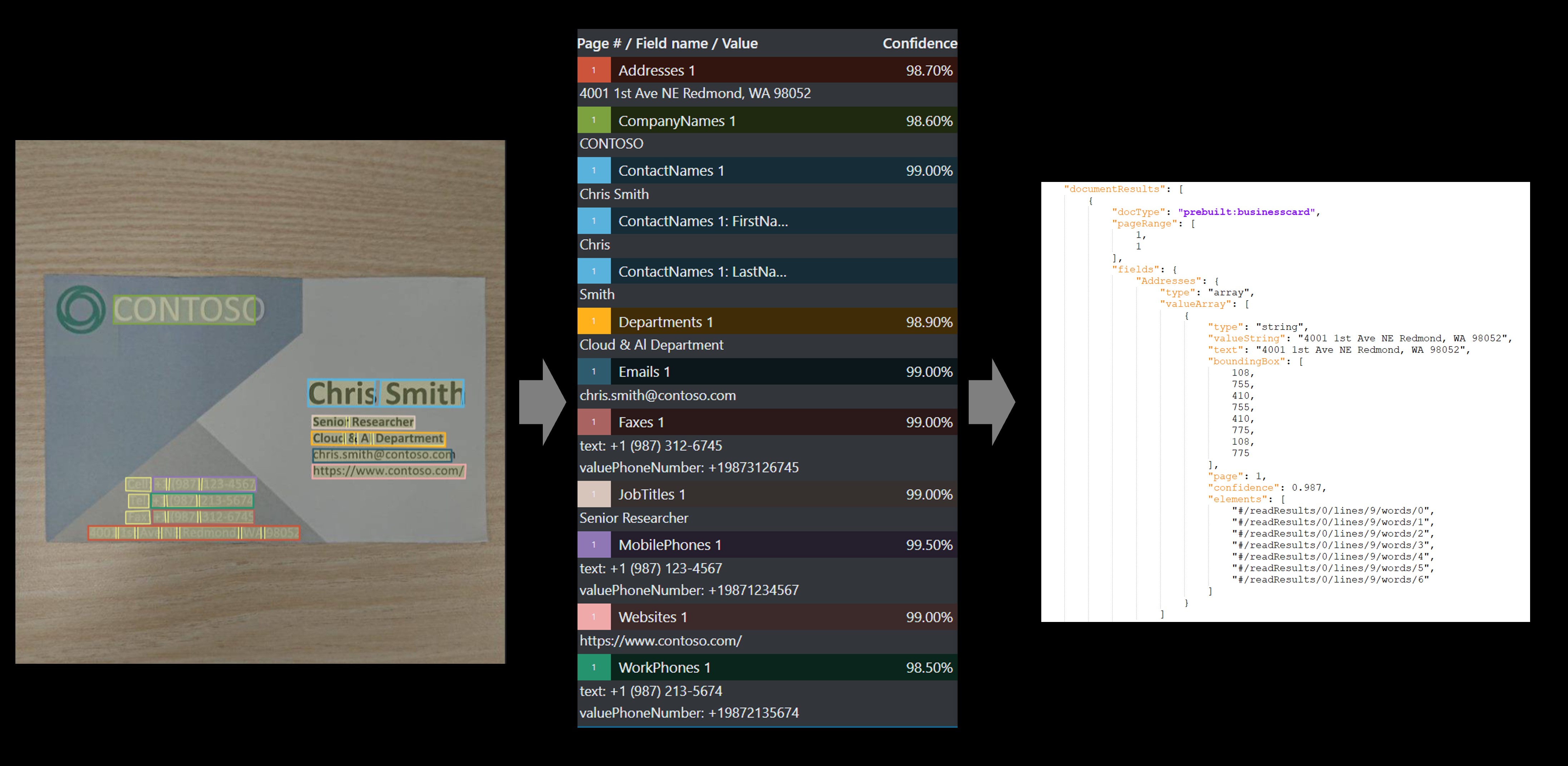
Custom
Custom models analyze and extract data from forms and documents specific to your business. The API is a machine-learning program trained to recognize form fields within your distinct content and extract key/value pairs and table data. You need only five examples of the same form type to get started. You can train your custom model with or without labeled datasets.
This sample custom model was processed by using the Sample Labeling tool.
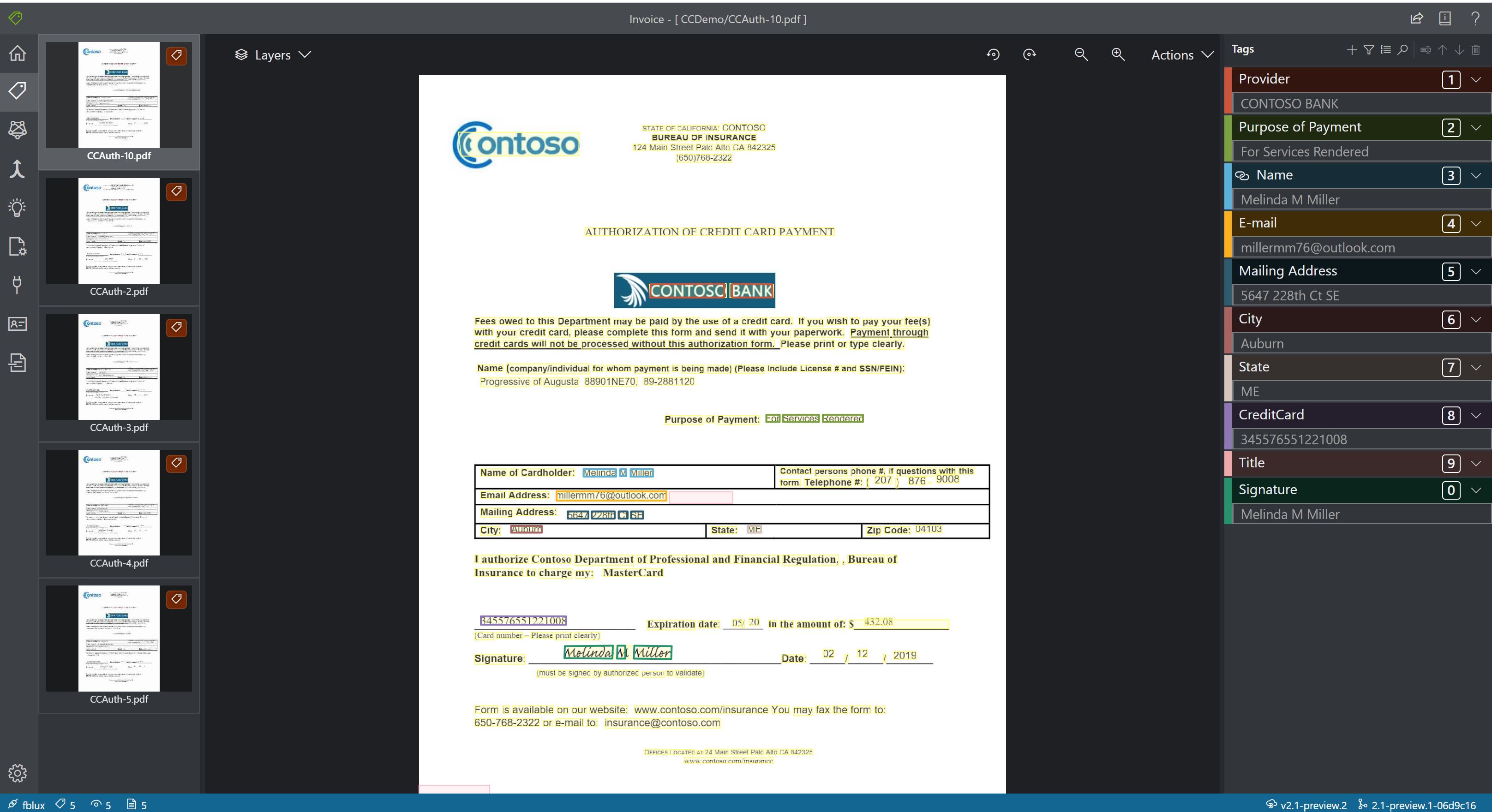
Composed custom model
A composed model is created by taking a collection of custom models and assigning them to a single model built from your form types. You can assign multiple custom models to a composed model that are called with a single model ID. You can assign up to 100 trained custom models to a single composed model.
This composed model pane was processed by using the Sample Labeling tool.

Model data extraction
| Model | Text extraction | Language detection | Selection marks | Tables | Paragraphs | Paragraph roles | Key/value pairs | Fields |
|---|---|---|---|---|---|---|---|---|
| Layout | ✓ | ✓ | ✓ | ✓ | ✓ | |||
| Invoice | ✓ | ✓ | ✓ | ✓ | ✓ | ✓ | ||
| Receipt | ✓ | ✓ | ✓ | |||||
| ID Document | ✓ | ✓ | ✓ | |||||
| Business Card | ✓ | ✓ | ✓ | |||||
| Custom Form | ✓ | ✓ | ✓ | ✓ | ✓ |
Input requirements
The following file formats are supported.
| Model | Image: JPEG/JPG, PNG, BMP, TIFF, HEIF |
Office: Word (DOCX), Excel (XLSX), PowerPoint (PPTX), HTML |
|
|---|---|---|---|
| Read | ✔ | ✔ | ✔ |
| Layout | ✔ | ✔ | ✔ |
| General document | ✔ | ✔ | |
| Prebuilt | ✔ | ✔ | |
| Custom extraction | ✔ | ✔ | |
| Custom classification | ✔ | ✔ | ✔ |
- Photos and scans: For best results, provide one clear photo or high-quality scan per document.
- PDFs and TIFFs: For PDFs and TIFFs, up to 2,000 pages can be processed. (With a free-tier subscription, only the first two pages are processed.)
- File size: The file size for analyzing documents is 500 MB for the paid (S0) tier and 4 MB for the free (F0) tier.
- Image dimensions: The dimensions must be between 50 pixels x 50 pixels and 10,000 pixels x 10,000 pixels.
- Password locks: If your PDFs are password-locked, you must remove the lock before submission.
- Text height: The minimum height of the text to be extracted is 12 pixels for a 1024 x 768-pixel image. This dimension corresponds to about 8-point text at 150 dots per inch.
- Custom model training: The maximum number of pages for training data is 500 for the custom template model and 50,000 for the custom neural model.
- Custom extraction model training: The total size of training data is 50 MB for template model and 1 GB for the neural model.
- Custom classification model training: The total size of training data is 1 GB with a maximum of 10,000 pages. For 2024-11-30 (GA), the total size of training data is 2 GB with a maximum of 10,000 pages.
- Office file types (DOCX, XLSX, PPTX): The maximum string length limit is 8 million characters.
Note
The Sample Labeling tool doesn't support the BMP file format. The limitation derives from the tool not Document Intelligence.
Version migration
You can learn how to use Document Intelligence v3.0 in your applications by following the steps in the Document Intelligence v3.1 migration guide
Related content
- Process your own forms and documents with Document Intelligence Studio.
- Finish a Document Intelligence quickstart, and then create a document processing app in the development language of your choice.
- Process your own forms and documents with the Document Intelligence Sample Labeling tool.
- Finish a Document Intelligence quickstart, and then create a document processing app in the development language of your choice.
